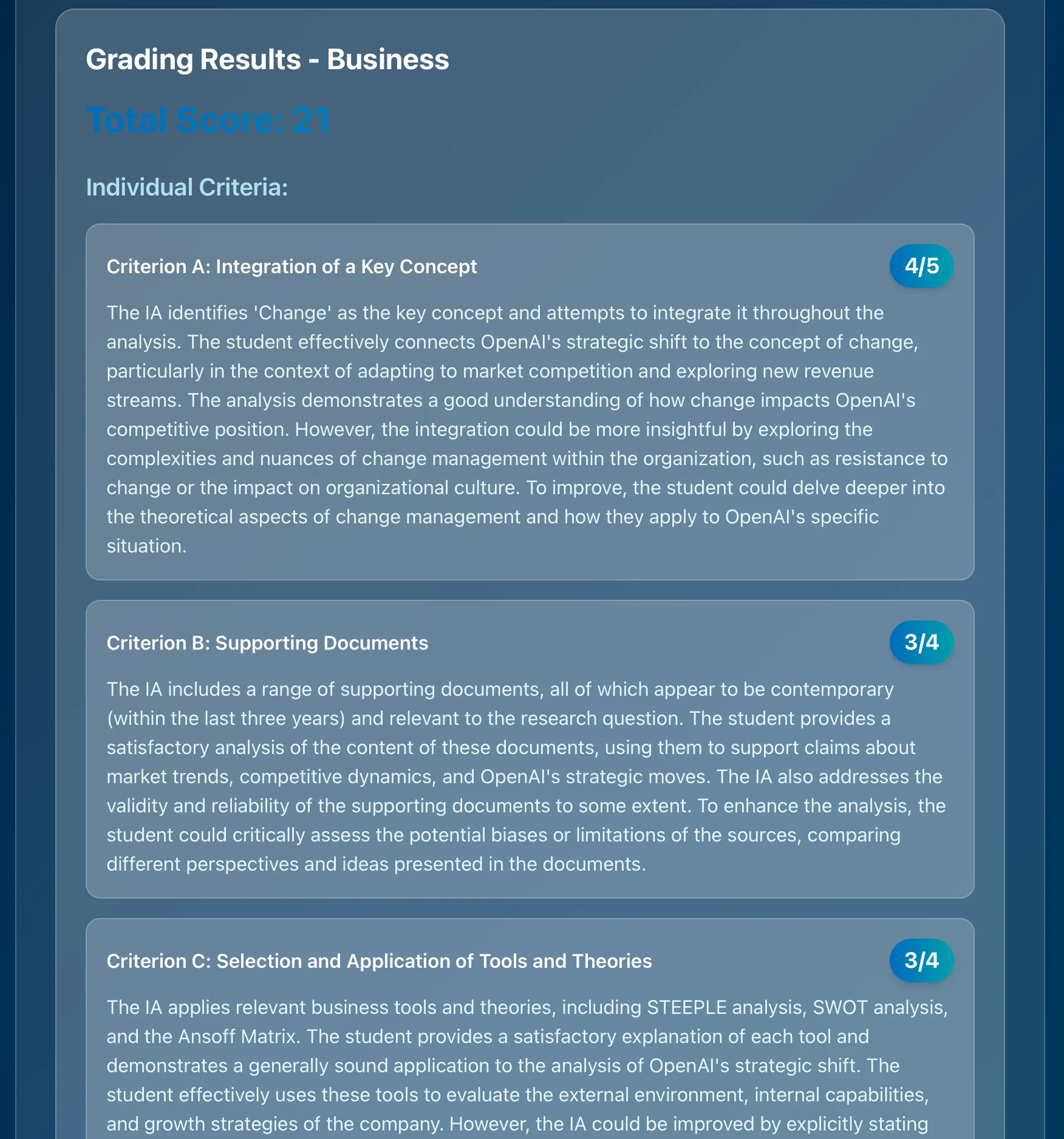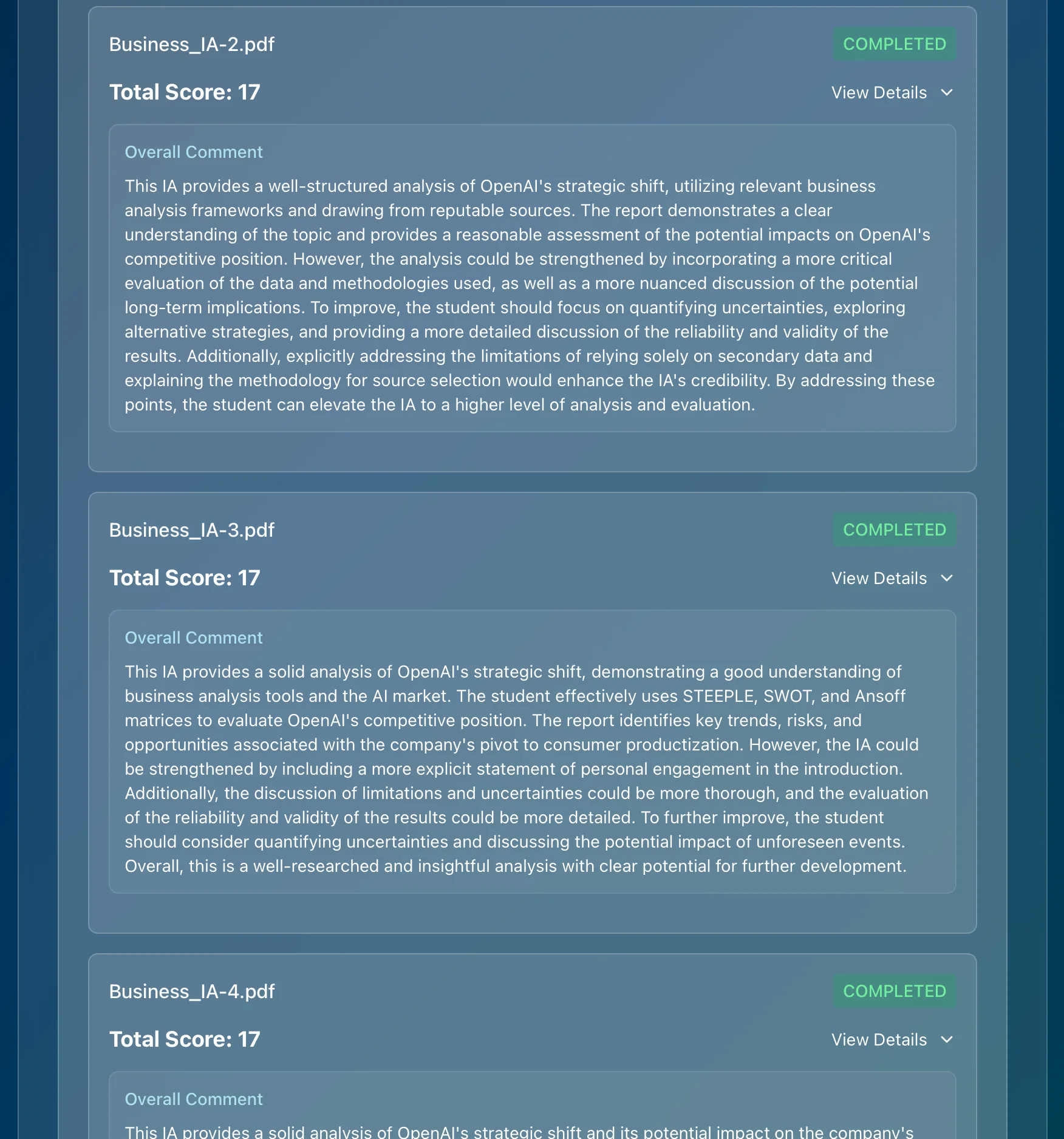Top Universities That Love IB Students
Are you an IB student aiming for top universities? Wondering which institutions truly appreciate the rigor and breadth of the International Baccalaureate (IB) program? You're in the right place! Many universities worldwide recognize the IB diploma as a mark of academic excellence and well-roundedness. This guide will explore which universities actively seek out IB students, why they value the IB curriculum, and how you can leverage your IB experience to gain admission. We'll also touch on how tools like Marksy, an AI grading assistant, can help you excel in your IB assessments and strengthen your university applications.
Why Universities Love IB Students
Universities appreciate IB students for several key reasons:
- Academic Rigor: The IB Diploma Programme (DP) is known for its challenging curriculum, demanding critical thinking, and independent research. Universities recognize that IB graduates are well-prepared for the demands of higher education.
- Well-Roundedness: The IB program encourages students to develop a broad range of skills and knowledge through its six subject groups, the Theory of Knowledge (TOK) course, the Extended Essay (EE), and Creativity, Activity, Service (CAS). This holistic approach produces well-rounded individuals who are adaptable and engaged.
- Global Perspective: The IB curriculum fosters international-mindedness and encourages students to consider global issues from multiple perspectives. This is highly valued by universities seeking to create diverse and globally aware student bodies.
- Strong Writing and Research Skills: The Extended Essay and various internal assessments require students to conduct independent research, analyze information critically, and communicate their findings effectively. These skills are crucial for success in university.
- Self-Management and Time Management: The IB program demands excellent self-management and time management skills. Students must juggle multiple subjects, meet deadlines, and balance academic work with extracurricular activities.
Struggling with IB Assessments?
Get instant, detailed feedback on your work with AI that understands IB criteria.

Top Universities That Actively Recruit IB Students
While many universities recognize and value the IB diploma, some actively recruit IB students and offer specific advantages to IB graduates. Here's a list of some top universities known for their appreciation of IB students:
- United States:
- Ivy League Universities (Harvard, Yale, Princeton, Columbia, UPenn, Brown, Dartmouth, Cornell): These universities consistently acknowledge the strength of the IB curriculum and often offer advanced placement or course credit to IB graduates.
- Stanford University: Stanford values the critical thinking and independent learning skills developed through the IB program.
- University of California System (UC Berkeley, UCLA, UC San Diego): The UC system recognizes the IB diploma for admission and often grants course credit for higher-level (HL) subjects.
- University of Chicago: Known for its rigorous academics, the University of Chicago appreciates the intellectual curiosity and analytical skills of IB students.
- Duke University: Duke actively seeks out students with a global perspective and strong academic foundation, making IB graduates attractive candidates.
- United Kingdom:
- University of Oxford: Oxford recognizes the IB diploma as a strong qualification for admission and often sets specific IB score requirements for different courses.
- University of Cambridge: Similar to Oxford, Cambridge values the academic rigor and breadth of the IB program.
- London School of Economics (LSE): LSE appreciates the analytical and critical thinking skills developed through the IB curriculum.
- Imperial College London: Imperial College London values the strong mathematical and scientific foundation provided by the IB program.
- University College London (UCL): UCL recognizes the IB diploma as a strong qualification for admission and offers specific guidance for IB applicants.
- Canada:
- University of Toronto: The University of Toronto recognizes the IB diploma and offers advanced placement or course credit for higher-level subjects.
- University of British Columbia (UBC): UBC values the global perspective and academic rigor of the IB program.
- McGill University: McGill actively recruits IB students and offers specific scholarships and awards to IB graduates.
- Europe (Outside UK):
- ETH Zurich (Switzerland): ETH Zurich recognizes the IB diploma as a strong qualification for admission, particularly for students pursuing STEM fields.
- Sciences Po (France): Sciences Po values the international-mindedness and critical thinking skills developed through the IB program.
- University of Amsterdam (Netherlands): The University of Amsterdam offers a wide range of English-taught programs and recognizes the IB diploma for admission.
- Australia:
- University of Melbourne: The University of Melbourne recognizes the IB diploma and offers advanced standing or course credit for higher-level subjects.
- University of Sydney: The University of Sydney values the academic rigor and breadth of the IB program.
Note: This list is not exhaustive, and many other universities around the world value the IB diploma. Always check the specific admission requirements of the universities you are interested in.
How to Leverage Your IB Experience for University Admissions
To maximize your chances of getting into your dream university, it's crucial to effectively showcase your IB experience in your application. Here are some tips:
- Highlight Your IB Scores: Your predicted and final IB scores are a significant factor in the admission process. Aim for high scores in your HL subjects, as these are often given more weight.
- Showcase Your Extended Essay: The Extended Essay demonstrates your research and writing abilities. Choose a topic that aligns with your academic interests and showcase your analytical skills.
- Emphasize Your TOK Experience: The Theory of Knowledge course encourages critical thinking and reflection. Discuss how TOK has shaped your understanding of knowledge and its limitations.
- Demonstrate Your CAS Involvement: Creativity, Activity, Service (CAS) demonstrates your commitment to personal growth and community engagement. Choose meaningful CAS activities that align with your values and showcase your leadership skills.
- Craft a Compelling Personal Statement: Your personal statement is your opportunity to tell your story and highlight your unique qualities. Emphasize how your IB experience has prepared you for university and how you can contribute to the university community.
- Obtain Strong Letters of Recommendation: Ask your IB teachers to write letters of recommendation that highlight your academic strengths, intellectual curiosity, and personal qualities.
Common Challenges/Mistakes IB Students Face
IB students often face specific challenges during their studies and university applications. Here are some common mistakes to avoid:
- Procrastination: The IB program requires excellent time management skills. Avoid procrastination by creating a study schedule and sticking to it.
- Poor Time Management: Juggling multiple subjects, internal assessments, and extracurricular activities can be overwhelming. Prioritize your tasks and allocate your time effectively.
- Underestimating the Extended Essay: The Extended Essay is a significant component of the IB diploma. Start early, choose a topic you are passionate about, and seek guidance from your supervisor.
- Ignoring TOK: The Theory of Knowledge course is often underestimated by students. Engage actively in class discussions, explore different perspectives, and reflect on your own knowledge and beliefs.
- Neglecting CAS: Creativity, Activity, Service (CAS) is an integral part of the IB program. Choose meaningful CAS activities that align with your values and demonstrate your commitment to personal growth and community engagement.
- Not Seeking Help When Needed: Don't hesitate to ask for help from your teachers, tutors, or classmates when you are struggling with a particular subject or assessment.
Pro Tip: Get AI-Powered Grading
Stop second-guessing your grades. Get instant feedback aligned with official IB rubrics.

Advanced Tips/Strategies for IB Success
To truly excel in the IB program and maximize your chances of university admission, consider these advanced tips and strategies:
- Develop Strong Study Habits: Effective study habits are crucial for success in the IB program. Experiment with different study techniques to find what works best for you.
- Master Time Management Skills: Time management is essential for balancing academic work with extracurricular activities. Use a planner or calendar to schedule your tasks and prioritize your time.
- Engage Actively in Class: Participate actively in class discussions, ask questions, and share your ideas. This will help you deepen your understanding of the material and develop your critical thinking skills.
- Seek Feedback on Your Work: Ask your teachers and classmates for feedback on your internal assessments and Extended Essay. This will help you identify areas for improvement and refine your work.
- Practice Past Papers: Practicing past papers is an excellent way to prepare for the IB exams. This will help you familiarize yourself with the exam format, identify your strengths and weaknesses, and improve your time management skills.
- Stay Organized: Keep your notes, assignments, and resources organized. This will help you find information quickly and efficiently.
- Take Care of Your Well-being: The IB program can be demanding. Make sure to take care of your physical and mental well-being by getting enough sleep, eating healthy, and exercising regularly.
Technology and Modern Assessment in IB
Technology is playing an increasingly important role in education, including the International Baccalaureate program. From online research tools to collaborative platforms, technology can enhance the learning experience and improve student outcomes.
One significant area where technology is making a difference is in assessment. AI-powered grading assistants, like Marksy, are transforming the way teachers provide feedback on student work. Marksy uses official IB rubrics to provide instant, accurate, and detailed feedback on internal assessments, Extended Essays, and other assignments. This helps teachers save time and provide consistent, criterion-by-criterion feedback that students can use to improve their work.
How Marksy Helps IB Students and Teachers:
- Rubric-Aligned Scoring: Marksy ensures that student work is assessed according to official IB rubrics, promoting fairness and consistency.
- Detailed Criterion-by-Criterion Feedback: Students receive specific feedback on each criterion, helping them understand their strengths and weaknesses.
- Suggestions for Improvement: Marksy provides actionable suggestions for improvement, guiding students on how to enhance their work.
- Time-Saving for Teachers: Marksy automates the grading process, freeing up teachers to focus on providing personalized support to students.
- Improved Student Understanding: By receiving clear and detailed feedback, students gain a deeper understanding of the assessment criteria and how to meet them.
By embracing technology and utilizing tools like Marksy, IB students and teachers can enhance the learning and assessment process, leading to improved outcomes and greater success.
Conclusion with Clear Next Steps
The International Baccalaureate diploma is a valuable asset for university admissions. By understanding which universities value the IB program, leveraging your IB experience effectively, and avoiding common mistakes, you can maximize your chances of getting into your dream university. Remember to focus on your studies, develop strong study habits, and seek help when needed.
Next Steps:
- Research Universities: Explore the websites of universities you are interested in and learn about their specific IB requirements.
- Plan Your IB Studies: Choose your subjects carefully and develop a study plan that aligns with your academic goals.
- Seek Guidance from Your Teachers: Ask your IB teachers for advice and support throughout your studies.
- Practice Past Papers: Familiarize yourself with the IB exam format by practicing past papers.
- Try Marksy for Free: See how Marksy can help you improve your IB scores or streamline your grading workflow. Sign up for a free trial today and experience the benefits of AI-powered grading assistance!
By taking these steps, you can set yourself up for success in the IB program and achieve your university aspirations. Good luck!